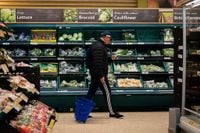On August 21, 2025, Tesco, the UK’s largest supermarket chain, quietly raised the price of its popular lunchtime meal deal by 25p, marking yet another chapter in the ongoing saga of rising food costs and inflation squeezing British households. The price for Clubcard holders jumped from £3.60 to £3.85, while those without a loyalty card now face a steeper £4.25 charge. Once a staple of affordable convenience, the meal deal—consisting of a main, snack, and drink—had held steady at £3 for a decade before its first major hike in October 2022, a move that signaled the end of an era for budget-conscious shoppers.
For many, this latest increase is more than just a few extra coins at the till. It’s a microcosm of broader economic pressures, as food and non-alcoholic drink prices have surged by 4.9% in the year to July, according to the Office for National Statistics (ONS). Over the past five years, food prices have climbed a staggering 37%, dwarfing the modest 4.4% increase seen in the previous five-year period. As the BBC reports, even the premium meal deal at Tesco has not been spared, rising from £5 to £5.50 for Clubcard holders and to £6 for others.
It’s not just Tesco feeling the heat. Sainsbury’s, another retail heavyweight, upped its lunchtime multibuy price from £3.75 to £3.95 in June, offering no price break for loyalty card users. Meanwhile, Boots, Co-op, Superdrug, and Waitrose have assured customers they have no plans to raise prices for their own meal deals, which currently range between £3.75 and £5.35. Asda, too, is holding steady with its Food To Go three-for-two lunch offer. But for many shoppers, the damage is already done. Kristina, a 19-year-old from Nottingham, captured the mood on social media, posting a photo with the caption, “One last time...Here’s my last £3.60 meal deal farewell.” She told the BBC, “Unless other places whack up their prices heavily, I won’t buy another meal deal from Tesco for a very long time.”
So what’s driving these relentless price increases? The answer, it seems, is a tangled web of global and domestic factors. According to the ONS, inflation in the UK climbed to 3.8% in July 2025, up from 3.6% in June, the highest level since January 2024. The biggest culprit? Soaring transport costs, especially air fares, which leapt by 30.2% in a single month as families scrambled to book summer holidays. Petrol and diesel prices also ticked up, compounding the pain at the pump and the supermarket checkout alike.
But food inflation is the real thorn in the side of British families. As reported by Retail Insight Network, food inflation alone hit 4.9% in July, a jump of nearly two percentage points in just four months. Kris Hamer, Director of Insight at the British Retail Consortium, explained, “Households are once again seeing the cost of their weekly shop climb, with food inflation now up by 1.9 percentage points in just four months.” While there was some relief in falling prices for items like olive oil, butter, and cheese, these bright spots were few and far between. Clothing and footwear inflation, at least, remained subdued.
Retailers, for their part, insist they’re doing everything possible to shield customers from the worst effects of inflation. Tesco points out that some of the most expensive items in its meal deal would cost more than £8 if purchased separately, and that its offer “remains great value.” With about 80% of Tesco shoppers using the Clubcard loyalty scheme, the supermarket’s data-driven approach to pricing is both a competitive tool and a way to reward loyalty—though some critics argue it creates a two-tier pricing system that disadvantages those without the card.
The squeeze isn’t limited to consumers. Supermarkets themselves are feeling the pinch from rising employment costs, government policy changes, and new taxes. In a letter sent to Chancellor Rachel Reeves on August 21, the British Retail Consortium—representing dozens of retailers including Tesco—warned that any new business taxes announced in the upcoming Autumn Budget would only push prices higher. The letter highlighted that employer National Insurance changes, higher employment costs, and the introduction of a new packaging tax have added £7 billion in costs to retail businesses. The Bank of England estimates these cost increases may have contributed an extra 1% to 2% to food prices. It expects food price inflation to peak at around 5.5% by the end of the year before easing to between 2% and 3% in 2026.
In the political arena, the debate over who’s to blame for rising prices has grown increasingly heated. City analysts at Shore Capital recently defended supermarkets against accusations of profiteering, pointing out that trading margins at major grocers are historically low—often under 5%. Their note, reported by the Daily Mail, criticized Liberal Democrat leader Sir Ed Davey for pressuring the Competition and Markets Authority (CMA) into investigating supermarket pricing in 2023. The CMA’s reports in July 2023 and July 2024 found no evidence that weak competition was driving up grocery prices, instead highlighting the sector’s razor-thin profit margins.
Shore Capital analysts argue that government policies—such as increases in National Insurance, the National Living Wage, and packaging taxes—are the main drivers of food inflation. “Profitability is currently materially challenged by UK Government policy, so much so that... 90 per cent of current inflation can be attributed to the State,” their report stated. The Liberal Democrats, for their part, maintain that every avenue should be explored to bring down prices for families, emphasizing the need for robust regulatory oversight to prevent potential abuses.
Chancellor Rachel Reeves, meanwhile, has acknowledged the ongoing challenges. “We have taken the decisions needed to stabilise the public finances, and we’re a long way from the double-digit inflation we saw under the previous government, but there’s more to do to ease the cost of living,” she said on August 21. She pointed to measures such as raising the minimum wage, extending the £3 bus fare cap, expanding free school meals to over half a million more children, and rolling out free breakfast clubs for every child in the country.
For British families, however, the road ahead looks tough. Shore Capital predicts that food inflation could hit between 5% and 6% by Christmas and remain “elevated” well into 2026, with real living standards expected to contract through mid-2027. As the Bank of England keeps a watchful eye on inflation, and retailers and politicians spar over the best path forward, the humble meal deal has become a symbol of a nation grappling with the cost of living crisis—one lunch at a time.





